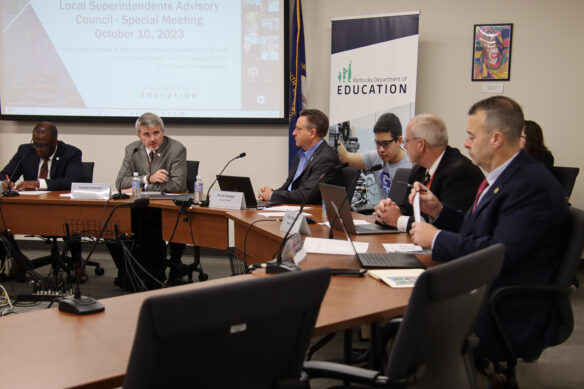
The Local Superintendents Advisory Council met in Frankfort on Oct. 10 to approve cut scores for Kentucky’s accountability system ahead of the release of the Kentucky School Report Card. Photo by Joe Ragusa, Oct. 10, 2023
The Local Superintendents Advisory Council (LSAC) approved cut scores for Kentucky’s accountability system during the LSAC meeting on Oct. 10.
“This, on the surface, is a quite simplistic concept system with change and status, but there’s lots of data behind the scenes, lots of detail behind the scenes,” said Rhonda Sims, Kentucky Department of Education (KDE) associate commissioner in the Office of Assessment and Accountability.
Using data from the 2022-2023 school year, Kentucky’s accountability system will provide a color-coded overall performance rating for each school, district and the state by level, ranging from red (lowest) to blue (highest). The color-coded rating, along with other important education data, will be available on the Kentucky School Report Card, which is expected to be publicly released in late October.
In Kentucky’s accountability system, schools are measured on a combination of academic and school-quality indicators and measures.
“Status” represents a school’s performance on a state indicator for the current year, while “change” represents the school’s performance on the indicator for the current year compared with the previous year. Status and change combine to provide a performance rating color for each state indicator.
Senate Bill 158 (2020) made several changes to the statewide accountability system, including the establishment of “status” and “change” as ways to evaluate state indicators. This will be the first year where change is reported.
The overall performance rating color is based on an overall score that combines data from all available indicators. The overall score is used to determine the state’s lowest-performing schools by level, as required federally.
A standard-setting committee met in September to recommend the cut scores. The committee included teachers, principals, superintendents, parents, a student, Kentucky Board of Education (KBE) members and other education stakeholders.
“We appreciate that the department is a strong proponent for doing (the standard-setting process) in an open, inclusive way,” said Brian Gong, senior associate at the Center for Assessment.
Mike Borchers, superintendent of Ludlow Independent, questioned whether the recent changes could penalize higher-performing schools if their indicators fall under the new change evaluation, leading to a discussion about potential safeguards from penalizing schools too much if they fall, but still perform well. The question was a common discussion point during meetings about the new accountability system.
“With what we have in statute, I think KDE did the best they could with the (state) requirements of color and also the federal requirements,” said Robbie Fletcher, LSAC chair and superintendent of Lawrence County schools.
Interim Commissioner of Education Robin Kinney also approved the cut scores on behalf of KDE.
Commissioner Search
KBE member Patrice McCrary asked LSAC members for their thoughts on the search for a new education commissioner.
Former KDE Associate Commissioner Robin Kinney took over as interim commissioner of education on Sept. 30 while the KBE searches for a permanent commissioner. More details about the search can be found on the 2023-2024 Commissioner Search webpage.
Russ Tilford, superintendent for Lyon County schools, said he wants a leader who is focused on students, first and foremost.
“If we focus on our students as our priority every day and put the adults and politics and policy secondary – or further on back, perhaps – we’ll be just fine,” he said.
David Raleigh, superintendent of LaRue County schools, said he wants a commissioner that will continue the deeper learning initiatives work of former Commissioner of Education Jason E. Glass.
“Those are the kinds of things that folks in my community and my families were asking for,” he said. “They want to see that project-based learning, that hands-on type stuff, the whole-child approach, so the kids are more than just that one single test score.”
Sheila Mitchell, superintendent of Anderson County schools, had a few things on her list of priorities: great communicator, student-focused and someone with experience in Kentucky. Fletcher said he wants to see a commissioner who has a presence across the state, “from Paducah to Pikeville.”
KBE is collecting feedback from multiple advisory groups and other stakeholders and will share them with the search firm that is hired to scout potential candidates.
In other business, the board:
- Reviewed 702 KAR 3:330 following changes made by Senate Bill 3 (2023) regarding liability insurance.
- Reviewed proposed amendments to 705 KAR 4:231, general program standards for secondary career and technical education (CTE) programs, to keep up with Perkins V requirements and align with current state CTE programs.
The next LSAC meeting is scheduled for Nov. 28.




Leave A Comment